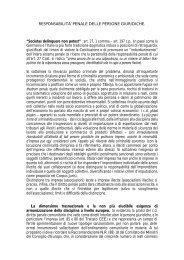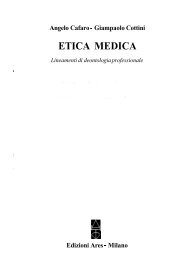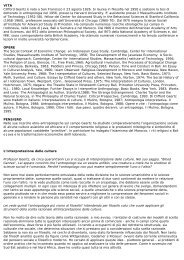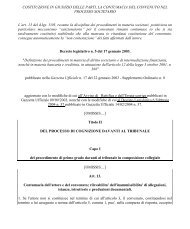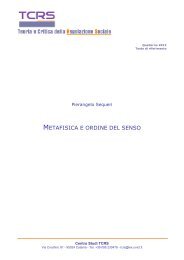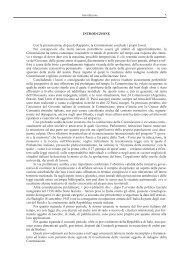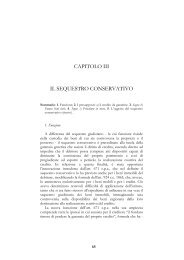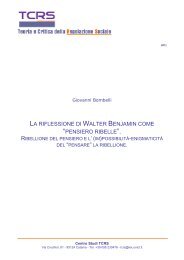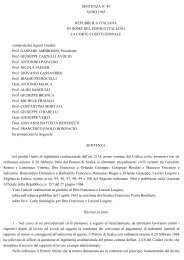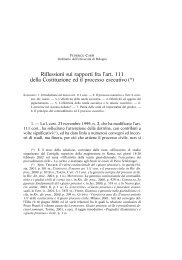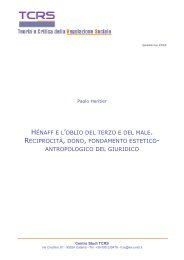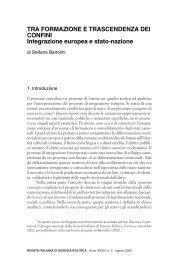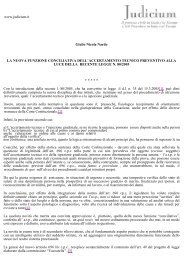FOGLI DI LAVORO per il Diritto internazionale 3 ... - Giurisprudenza
FOGLI DI LAVORO per il Diritto internazionale 3 ... - Giurisprudenza
FOGLI DI LAVORO per il Diritto internazionale 3 ... - Giurisprudenza
You also want an ePaper? Increase the reach of your titles
YUMPU automatically turns print PDFs into web optimized ePapers that Google loves.
46<br />
<strong>FOGLI</strong> <strong>DI</strong> <strong>LAVORO</strong> <strong>per</strong> <strong>il</strong> <strong>Diritto</strong> <strong>internazionale</strong> 3/2008<br />
13, lett. l del progetto, infatti, affermava che <strong>il</strong> termine riserva<br />
“ne s’applique pas … à des déclarations explicatives ou interprétatives,<br />
sauf le case où ces déclarations font présumer une divergence<br />
sur les dispositions de fonds ou sur les effets du traité”. Il<br />
Relatore speciale riteneva dunque che le dichiarazioni interpretative<br />
ordinariamente non costituissero delle riserve, ma che potessero<br />
essere qualificate come tali qualora incidessero sulle disposizioni<br />
del trattato; tale conclusione fu accolta dalla Commissione<br />
18 .<br />
Il successivo rapporto, affidato al Relatore speciale<br />
Waldock (1962) 19 , affrontò <strong>il</strong> problema in maniera più esplicita<br />
20 . L’art. 1 lett. l prevedeva infatti che “une déclaration explicative<br />
ou interprétative ou une déclaration d’intention concernant le<br />
sens du traité qui n’équivaut pas à modifier le conséquences juridiques<br />
du traité ne constitue pas une réserve”. La disposizione fu<br />
tuttavia eliminata dal Drafting Committee, che riteneva che <strong>il</strong><br />
problema avrebbe dovuto essere affrontato nel commento 21 .<br />
Così, nel Rapporto della Commissione che accompagnava <strong>il</strong> progetto<br />
del 1962 si legge: “States, when signing, ratifying, acceding<br />
to, accepting or approving a treaty, not infrequently make<br />
declarations as to their understanding of some matter or as to<br />
their interpretation of a particular provision. Such a declaration<br />
may be a mere clarification of the State’s position or it may<br />
amount to a reservation, according as it does or not vary or exclude<br />
the application of the terms of the treaty as adopted” 22 .<br />
18 Nel commento, l’Autore precisava che le dichiarazioni esplicative non<br />
avrebbero mai potuto avere valore di riserve e tale affermazione valeva anche<br />
<strong>per</strong> le statuizioni con le quali gli Stati dichiarano le modalità di adempimento<br />
del trattato (le cosiddette dichiarazioni di intenti). Quanto alle prime, la differenza<br />
rispetto alle dichiarazioni interpretative non appare del tutto chiara (si<br />
veda R. SAPIENZA, Dichiarazioni interpretative, cit., p. 129, nota 55); <strong>per</strong> ciò<br />
che riguarda le seconde, si tratta essenzialmente di dichiarazioni<br />
sull’applicazione del trattato, oggi generalmente considerate dichiarazioni interpretative<br />
(ib., pp. 1 e 8).<br />
19 A/CN. 4/144 e Add. 1.<br />
20 R. SAPIENZA, Dichiarazioni interpretative, cit., p. 130 ss.<br />
21 D. M. MCRAE, «The Legal Effect», cit., p. 157.<br />
22 A/CN. 4/148, p. 163. Si vedano F. HORN, Reservations, cit., p. 231 e<br />
R. SAPIENZA, Dichiarazioni interpretative, cit., p. 132, <strong>il</strong> quale, nel commentare<br />
<strong>il</strong> rapporto, sottolinea come la sua importanza risieda nel fatto che esso<br />
chiarì <strong>per</strong> la prima volta come <strong>il</strong> problema non fosse tanto quello di isolare<br />
una categoria autonoma costituita dalle dichiarazioni interpretative, ma piutto-



